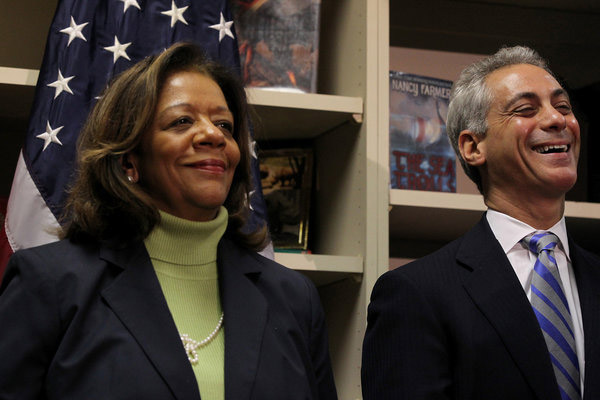Open letter to Chicago Public Schools CEO and the Latino Advisory Committee

By Ray Salazar, NewsTaco
As Chicago Public Schools CEO Barbara Byrd-Bennet and the Latino Advisory Committee prepare for their second meeting next week, I share this feedback to emphasize that, in order to fulfill its purpose of increasing engagement with the Latino community and enhancing the educational success of Latino students , the committee must include CPS teachers as regular members. I know that at least one committee member expressed my concern to the CEO.
Some argue that having teachers, who make a salary from the district, join the committee might put those teachers in an uncomfortable position. However, I and many other teacher bloggers regularly present criticisms of CPS policies and, to my knowledge, no one has been fired or disciplined for presenting these ideas. We express our ideas and propose solutions comfortably.
This week, Saucedo teachers, at a school with a 97% low-income student population and a 96% Latino population, took a bold stance against unnecessary testing. This also proves that many CPS teachers are willing to speak up and present ways to improve education for Latino students.
If the committee is truly going to offer insight into how to improve the educational experiences of Latino CPS students, I ask the committee to start by advocating for and welcoming every day practioners to their table. Teachers will be affected by recommendations made at that table and, therefore, need to also shape them.
I was told that, in my first post about this committee, it sounded like I was criticizing the members of the committee. I believe the committee members have good intentions. I believe they want to improve the education for Latino students. But they have to recognize that not everything they do and suggest is going to be accepted without questioning and criticism. As experienced leaders, the committee members know this. Byrd-Bennett knows this.
As experts in policy and the non-profit sector, committee members need to determine the process for merging the conversation gap between central office and classrooms with Latino students. Therefore, committee members and Bryd-Bennet must bring successful, thoughtful teachers from Latino communities to the table. By being inclusive, the committee can gain deeper insight into the needs, challenges, and opportunities that exist.
The committee has focus areas (cited in my previous post). My question for the committee and Byrd-Bennet is: who determined that these topics were the most pressing issues affecting Latino students and how did they do this?
With teacher voice at the table, the Latino Advisory Committee and Byrd-Bennett can truly know the effect of current policies that deter Latino students from making greater gains. These include but are not limited to:
- Decreasing the amount of questionable testing in the district
- Eliminating unreasonable testing demands of English learners—demands that may prevent their admission to selective-enrollment schools
- Educating Latino families about admission opportunities at selective-enrollment elementary and secondary schools
- Addressing the fact that these popular schools are not easily accessible from neighborhoods with large low-income Latino populations
- Recognizing the inequality that overcrowding and poor architectural infrastructure creates for Latino students—especially on the Southwest Side (Payton College Prep just got a $17 million expansion; Jones College Prep got a $115 million new building after a $14 million renovation in 2001.)
- Securing safe-passage routes in neighborhoods, like Little Village, with a high rate of violence
- Solidifying long-term partnerships with organizations that can provide the extra-curricular and culturally sensitive social-emotional services that schools alone cannot provide
- Establishing a support system for Latino college students—most of whom are first-generation
These are just my views—and, I hope, other CPS teachers will present needs that might be more pressing. The Latino Advisory Committee and Byrd-Bennett will only know this if successful, thoughtful teachers from Latino communities are welcomed as regular members of the CPS Latino Advisory Committee.
Finally, my intention here is not for me gain a seat at that table. The process for ensuring teacher voice at the table is something the committee , which now exists as a formal group of Latino advocates, must determine and share. The committee should own the responsibility of guaranteeing teacher voice to solidify true collaboration.
This is how we can truly work together for the benefit of students.
Sincerely,
Ray Salazar, NBCT
This article was originally published in The White Rhino.
Ray writes The White Rhino, a blog about Latino and education issues. Follow him@whiterhinoray.
[Photo courtesy of CPS Chatter]
